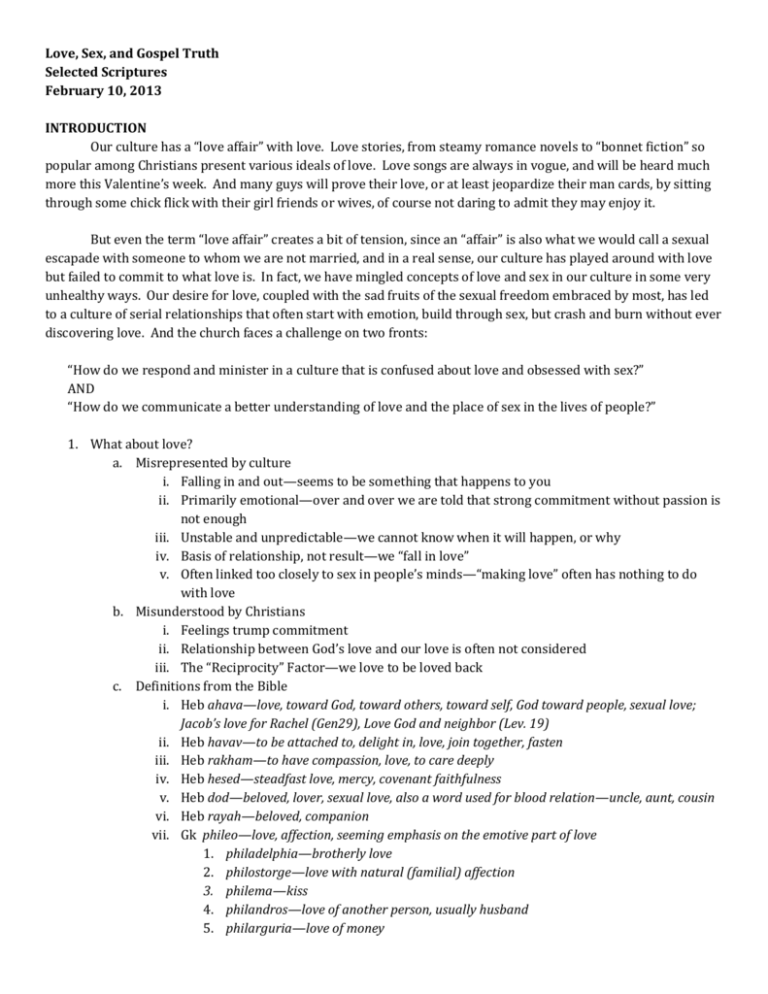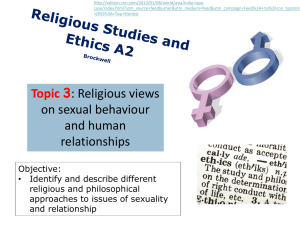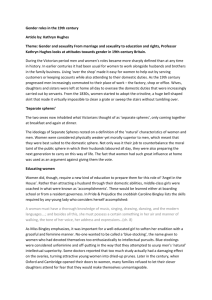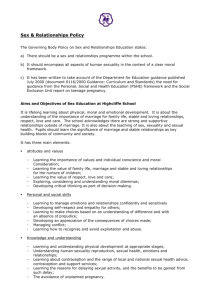
Love, Sex, and Gospel Truth
Selected Scriptures
February 10, 2013
INTRODUCTION
Our culture has a “love affair” with love. Love stories, from steamy romance novels to “bonnet fiction” so
popular among Christians present various ideals of love. Love songs are always in vogue, and will be heard much
more this Valentine’s week. And many guys will prove their love, or at least jeopardize their man cards, by sitting
through some chick flick with their girl friends or wives, of course not daring to admit they may enjoy it.
But even the term “love affair” creates a bit of tension, since an “affair” is also what we would call a sexual
escapade with someone to whom we are not married, and in a real sense, our culture has played around with love
but failed to commit to what love is. In fact, we have mingled concepts of love and sex in our culture in some very
unhealthy ways. Our desire for love, coupled with the sad fruits of the sexual freedom embraced by most, has led
to a culture of serial relationships that often start with emotion, build through sex, but crash and burn without ever
discovering love. And the church faces a challenge on two fronts:
“How do we respond and minister in a culture that is confused about love and obsessed with sex?”
AND
“How do we communicate a better understanding of love and the place of sex in the lives of people?”
1. What about love?
a. Misrepresented by culture
i. Falling in and out—seems to be something that happens to you
ii. Primarily emotional—over and over we are told that strong commitment without passion is
not enough
iii. Unstable and unpredictable—we cannot know when it will happen, or why
iv. Basis of relationship, not result—we “fall in love”
v. Often linked too closely to sex in people’s minds—“making love” often has nothing to do
with love
b. Misunderstood by Christians
i. Feelings trump commitment
ii. Relationship between God’s love and our love is often not considered
iii. The “Reciprocity” Factor—we love to be loved back
c. Definitions from the Bible
i. Heb ahava—love, toward God, toward others, toward self, God toward people, sexual love;
Jacob’s love for Rachel (Gen29), Love God and neighbor (Lev. 19)
ii. Heb havav—to be attached to, delight in, love, join together, fasten
iii. Heb rakham—to have compassion, love, to care deeply
iv. Heb hesed—steadfast love, mercy, covenant faithfulness
v. Heb dod—beloved, lover, sexual love, also a word used for blood relation—uncle, aunt, cousin
vi. Heb rayah—beloved, companion
vii. Gk phileo—love, affection, seeming emphasis on the emotive part of love
1. philadelphia—brotherly love
2. philostorge—love with natural (familial) affection
3. philema—kiss
4. philandros—love of another person, usually husband
5. philarguria—love of money
6. philanthropia—love of mankind
viii. Gk agapeo—most common in NT; love, often of God for man (BUT NOT EXCLUSIVELY), of man
for God, and toward others. Difference from phileo is in a stronger emphasis on the will—the
choice to love, to commit
ix. One Greek word for love that was common then never appears in the NT—eros
d. Is love the “cart” or the “horse”?
2. What about sex?
a. The Gift of God
i. Created by God and good
ii. One flesh; not solely physical union, but the physical is an enactment of it
1. Not all sex creates “one flesh”—see 1 Cor 6
2. One flesh refers to becoming fully a part of each other
iii. Created for covenanted couples—Adam and Eve being the first
1. Not just for procreation (Genesis 1:28)
2. Sexual love in marriage celebrated—Song of Songs 7:1-9
3. God put a man and a woman in a perfect outdoor setting, naked and told them to be
fruitful and multiply. If “multiplied pain and conceptions” was a part of the curse,
then the attempt to be fruitful would necessarily involve lots of intimacy to produce
a child!
iv. God is PRO-SEX; he created it when he could have created reproduction through a number
of other means, and none of them as pleasurable
b. The Corruption by Culture: No one has to wonder whether our culture continues to sexual
revolution begun in the 1960s. It might be said that the revolution won the culture, and now
thinking that is not in line is considered at best antiquated and at worst dangerous.
i. In 2011 nationwide studies reported
1. 47.4% of all high school students report having had sexual intercourse
2. 33.7% of all high schools students report having had intercourse in the last three
months
3. 40% report not having used a condom and 77% report not having used any form of
birth control pill the last time they had sex
4. A compilation of national studies report that between 18-19% of young people 14
and under have become sexually active, having had intercourse by that age. 12-14%
of girls and 20-22% of boys
5. Over 15% of all high school students report having had 4 or more sex partners in
their lifetimes.
6. All of these statistics tend to go higher when other forms of sexual activity, going
beyond what used to be called “making out” to practices that include mutual
masturbation, oral sex and anal sex
ii. More than 400,000 girls 15-19 gave birth in 2009, and it is estimated that half again of that
number chose abortion
iii. Nearly half of the 19 million new cases reported of sexually transmitted diseases in the
most recent reporting year are among people ages 15-24
iv. Co-habitation is the new expectation:
1. Half of young people in their 20s said they would only marry someone who would
live with them first
2. Half of all marriages are preceded by couples living together, but the success rate of
those marriages appears to be smaller than those of couples who do not
3. 45% of couples who live together split up before marriage
4. 45% of couples who live together do marry, but over 67% of those who do marry
will divorce in ten years or less
5. 5-10% live together but never marry
6. Women tend to view this a preparation for marriage
7. Men tend to view this as postponing a decision while determining whether the
relationship is right
v. Sexual experimentation is not just on the rise among children and young people, but is
encouraged in some school and youth settings
vi. 40 million Americans are regular visitors of internet pornography sites, and 12% of all sites
on the internet are porn sites.
vii. “Sex Week” at Yale and other institutions offers a bizarre, weeklong “fair” featuring a host
of booths sponsored by porn distributors, advocacy groups for alternative sex practices, and
school sponsored lectures on various practices such as sadism, masochism, bondage, and
other topics supposedly to provide both free expression and clearer sex education to
students. Despite annual protests by more conservative students, “Sex Week” was
cancelled at Yale only after a study found that it was creating an environment hostile to
women’s safety and security.
c. Sex as an urge or drive to be fulfilled
i. The “naturalness” of lust
1. “Lustful intent” in Matt 5: desiring sexually and/or emotionally something from
someone with whom you are not covenantally bound.
2. The greatest promoters of this—pornography and fantasy
a. These dehumanize their objects (we do not view those people as “souls”)
b. They derail our ability to sustain relationships—studies indicate that
prolonged exposure re-wires the brain and creates a new linkage between
the rush of porn and sexual excitement, derailing normal relational
connections
c. John Mayer expressed a preference for porn and fantasy—think about the
“beautiful” women he has been associated with.
ii. Sex as essential part of building a relationship—the most common reason stated for
premarital sex
iii. Sexual expression outside of marriage
1. “Sexual immorality” Gk. porneia
2. Never seen as a positive occurrence
3. 1 Cor 6:9, 13, 18
a. Condemned with other sins as a mark of the unbeliever
b. We are not meant for this
c. We are to flee this
4. In OT Law, sexual activity between unmarried, unpledged people was to result in a
marriage
5. All marriages in Scripture are preceded by some sort of acknowledgement before
society, usually some sort of feast. Sex beforehand was not permitted.
d. The weight sex cannot bear
i. It cannot define us—we are not primarily “sexual beings”
1. To define ourselves by sexuality is to diminish our place as “image bearers”
2. We are souls, made of up spirit and body
ii. It cannot sustain a relationship
1. Our relationships today have not been strengthened or lengthened by sexual activity
alone
2. The emphasis today is on technique and frequency, not on the bond of the
relationship
3. It is meant to be a part of a physical/spiritual/emotional relationship
CONCLUSION
What does the gospel have to do with this—how do we respond to God’s teaching and our culture?
1) The Gospel is God’s message that culminates in the person of Jesus. He, his prophets in the OT and his apostles
in the NT all give us teaching that explains what love and sex were meant to be, how they have been broken by
sin, and how they can be restored.
2) Teaching that is positive about both love and sex is essential in our homes and churches
a. We must define, cultivate, and demonstrate the fullness of biblical love, as a feeling, as a direction of life,
as a choice, and as the expression of affection
b. We must present sex, not as something evil or sinful, but something immensely good but that will not
be experienced as good outside of marriage
c. Explain God’s plan and its superiority to any others
3) Human love is derivative from God’s love
4) Sexual expression is God’s gift to the marriage covenant
5) The greatest weapon you have in protecting yourself from attacks on sexual purity outside of marriage and
sexual fidelity in marriage—a vibrant and growing relationship with Jesus Christ
6) The importance of wisdom:
a) Studying the Word to know God
b) Practical protection (internet and phone filters) to guard against the moments when your guard is down
7) The freedom of forgiveness
Next time we will consider together the relationship that is meant to demonstrate love to the world, teach us about
love’s true meaning, and give us the one context in which sexual expression can be experienced without any guilt
or shame and with the fullest blessings of God—the covenant relationship of marriage.








